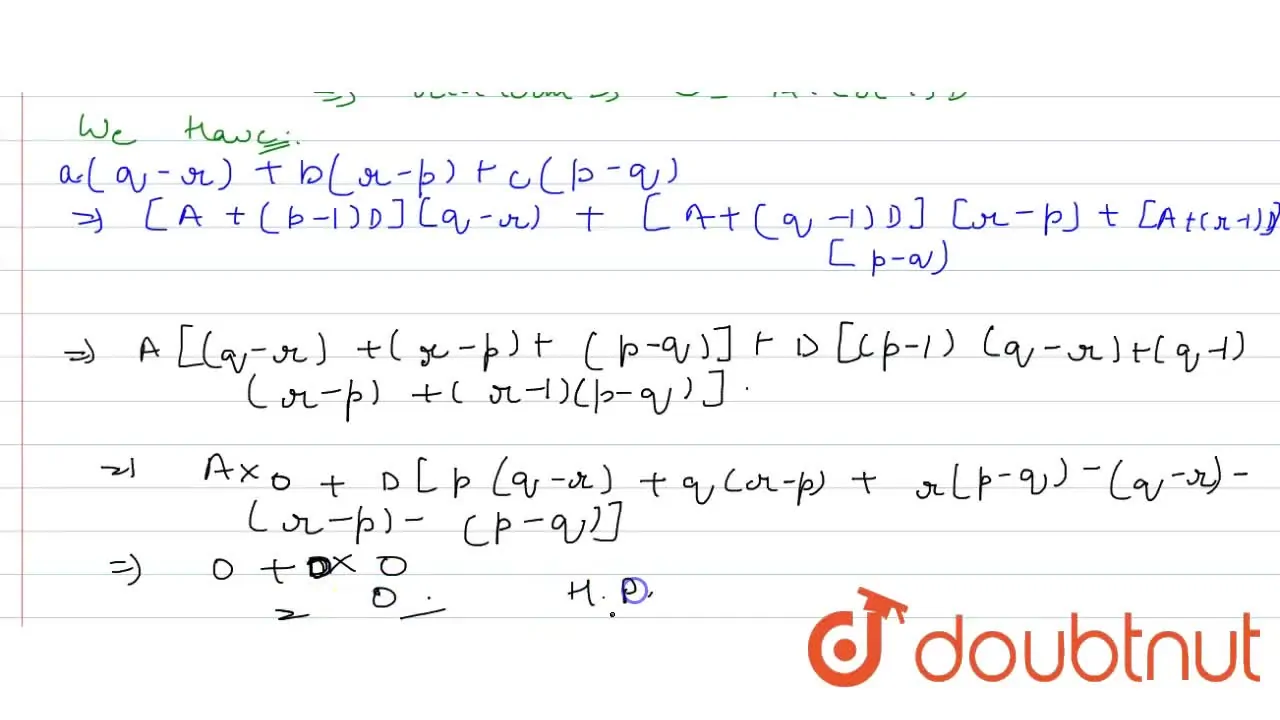If a , b and c b respectively the pth , qth and rth terms of an A.P. prove that
a(q-r) +b(r-p) +c (p-q) =0
Step by step video & image solution for If a , b and c b respectively the pth , qth and rth terms of an A.P. prove that a(q-r) +b(r-p) +c (p-q) =0 by Maths experts to help you in doubts & scoring excellent marks in Class 11 exams.
Related Playlists
- BOOK - ICSECHAPTER - SEQUENCE AND SERIES EXERCISE - EXERCISE 14 (a)13videos
SEQUENCE AND SERIES
- BOOK - ICSECHAPTER - SEQUENCE AND SERIES EXERCISE - EXERCISE 14 (b)22videos
SEQUENCE AND SERIES
- BOOK - ICSECHAPTER - SELF ASSESSMENT PAPER 5EXERCISE - SECTION C11videos
SELF ASSESSMENT PAPER 5
- BOOK - ICSECHAPTER - SEQUENCES AND SERIESEXERCISE - MULTIPLE CHOICE QUESTIONS34videos
SEQUENCES AND SERIES
Similar Questions
If a,b,andc are respectively, the pth, qth , and rth terms of a G.P., show that (q−r)loga+(r−p)logb+(p−q)logc=0.
View SolutionIf a,b,andc are respectively, the pth, qth , and rth terms of a G.P., show that (q−r)loga+(r−p)logb+(p−q)logc=0.
View SolutionIf a,b,c are respectively the pth,qthandrth terms of a G.P. show that (q−r)loga+(r−p)logb+(p−q)logc=0.
View SolutionIf p,q,r are in A.P., show that the pth, qth and rth terms of any G.P. are in G.P.
View SolutionIf pth, qth, and rth terms of an A.P. are a,b,c, respectively, then show that (1)a(q−r)+b(r−p)+c(p−q)=0 (2)(a−b)r+(b−c)p+(c−a)q=0
View SolutionIf rational numbers a,b,c be th pth, qth, rth terms respectively of an A.P. then roots of the equation a(q−r)x2+b(r−p)x+c(p−q)=0 are necessarily (A) imaginary (B) rational (C) irrational (D) real and equal
View SolutionIf pth, qth , rth and sth terms of an AP are in GP then show that (p-q), (q-r), (r-s) are also in GP
View SolutionIf p,q,andr are inA.P., show that the pth, qth, and rth terms of any G.P. are in G.P.
View SolutionIf p,q,andr are inA.P., show that the pth, qth, and rth terms of any G.P. are in G.P.
View SolutionIf pth,qth and rth terms of an A.P. are a, b, c respectively, then show that (i) a(q-r)+b(r-p)+c(p-q)=0
View Solution


